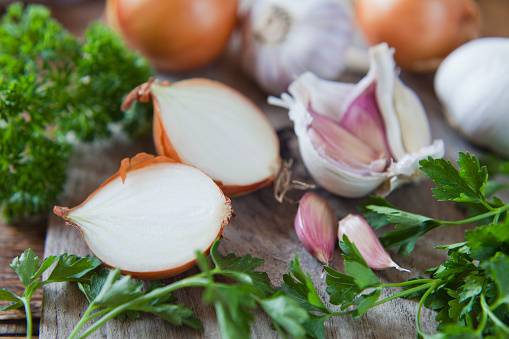
Winter nutritional tips: The health effects of both onions and garlic are amazing. This vegetable family includes potent oils with an anti-microbial influence, which can help to protect our body against bacterial and viral infections.
During the extreme winter days wherever one stays in the entire nation there are some key points which should be kept on mind for staying healthy even during the cold windy days of our winter season.
-
In winter, we should get enough Vitamin C and D
-
Keeping our body hydrated and remaining involved physically,
-
Including plenty of seasonal vegetables and fruits in our diet.
There are other points too that would be discussed in details in the later part of the article.
This is a fact that no one in this world tends to waste their days dealing for a runny nose, a cough or a fever. But, with the season, such illnesses as colds and influenza arrive, right? Ok, it's not just about having extra vitamin C to help boost our immunity.
It always pays to eat plenty of fruits and vegetables filled with protecting nutrients, but there are other foods that we can eat and additional steps that we can in-corporate to give our self the best chance of feeling fit and safe, especially when the flu season arrives.
Eating a healthy meal will make it easier for our body to appreciate foods and beverages that help ease symptoms by providing the energy and nutrition it requires to battle the cold or flu.
-
Here are some of the health tips that we should try and follow in order to enjoy the winter season without any fear of having a runny nose or a sore throat:
-
Consume plenty of colorful fruits and berries: vegetables and fruits are high in beta-carotene that our bodies transform to vitamin A, such as sweet potatoes, butternut squash, beetroot, mango, melon, apricots, etc. The presence of vitamin A tends to keep the mucosal linings in our nose and lungs sufficiently healthy to protect against infection.
-
Adding onion and garlic to the diet: The health benefits of both onion and garlic are amazing. This vegetable family includes potent oils with an anti-microbial influence, which can help to protect against bacterial and viral infections. In addition, prebiotics, also encourage good gut health by encouraging the growth of healthy bacteria.
-
Consume sufficiently Vitamin C: In nature, citrus fruits are abundant and contain vitamin C that has long been considered the ideal precaution against getting the common cold. When battling infections, the white blood cells in the body use up a lot of vitamin C and it is also important that we replenish the body's supplies every day.
-
Get Vitamin D: Vitamin D is an essential nutrient for general wellbeing, and tests have found that people at higher risk of infection are deficient in this vital vitamin. Therefore, along with sunshine exposure, foods such as egg yolks, mushrooms, salmon, canned tuna, and beef liver can be eaten to raise Vitamin D levels.
-
Stay active: To remain active, involve oneself as much as possible with any form of physical exercise. Moderate activity will help to strengthen the immune system, and the cells that shield us from disease promote the development of white blood cells.
-
Keep hydrating the body: It still helps to preserve healthy health by keeping hydrated. It's an evergreen fitness tip that still works to the body's benefit. It can help us feel safe, combat germs and pathogens, and avoid the onset of diseases by being properly hydrated.
Staying well, when we don't feel well, is more than simply doing a few good strategies. It needs daily exercise during the day, nutritious meals, and remaining hydrated. To keep us going and alive, the body works hard, so we should make sure to give it the fuel it needs to stay in proper condition. Just taking some initiatives from our end we can prevent our body from getting cough and cold or any kind of winter related disease which can eventually have a long-term effect on our body as well.
















